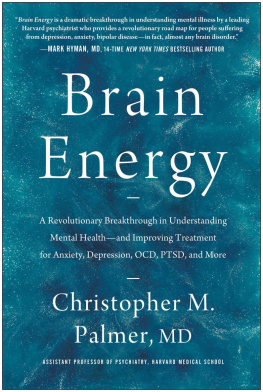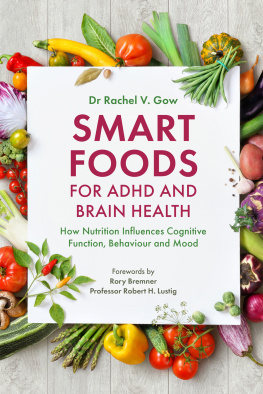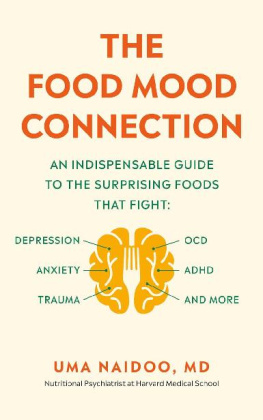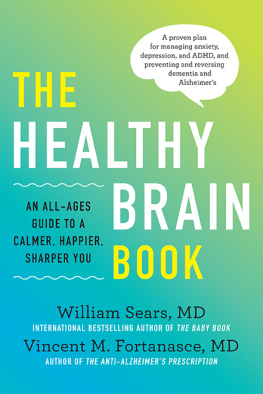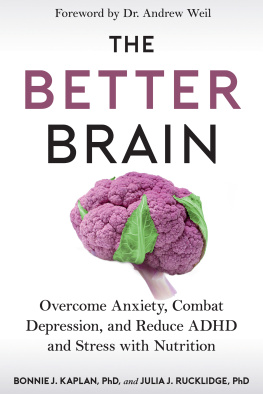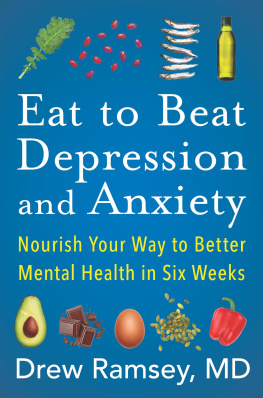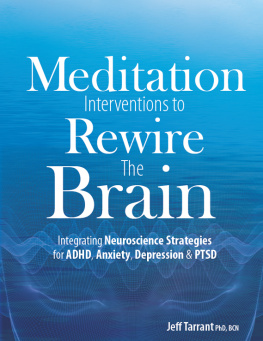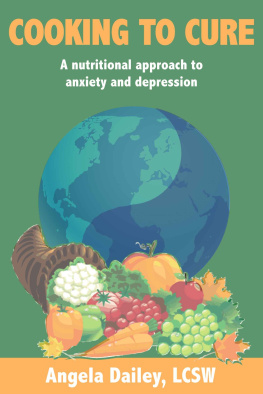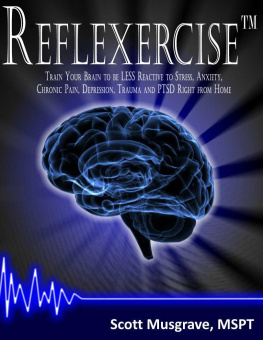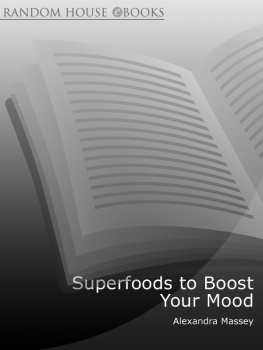Uma Naidoo - Your brain on food : an indispensable guide to the surprising foods that fight depression, anxiety, PTSD, OCD, ADHD, and more
Here you can read online Uma Naidoo - Your brain on food : an indispensable guide to the surprising foods that fight depression, anxiety, PTSD, OCD, ADHD, and more full text of the book (entire story) in english for free. Download pdf and epub, get meaning, cover and reviews about this ebook. year: 2020, genre: Romance novel. Description of the work, (preface) as well as reviews are available. Best literature library LitArk.com created for fans of good reading and offers a wide selection of genres:
Romance novel
Science fiction
Adventure
Detective
Science
History
Home and family
Prose
Art
Politics
Computer
Non-fiction
Religion
Business
Children
Humor
Choose a favorite category and find really read worthwhile books. Enjoy immersion in the world of imagination, feel the emotions of the characters or learn something new for yourself, make an fascinating discovery.

- Book:Your brain on food : an indispensable guide to the surprising foods that fight depression, anxiety, PTSD, OCD, ADHD, and more
- Author:
- Genre:
- Year:2020
- Rating:5 / 5
- Favourites:Add to favourites
- Your mark:
- 100
- 1
- 2
- 3
- 4
- 5
Your brain on food : an indispensable guide to the surprising foods that fight depression, anxiety, PTSD, OCD, ADHD, and more: summary, description and annotation
We offer to read an annotation, description, summary or preface (depends on what the author of the book "Your brain on food : an indispensable guide to the surprising foods that fight depression, anxiety, PTSD, OCD, ADHD, and more" wrote himself). If you haven't found the necessary information about the book — write in the comments, we will try to find it.
Uma Naidoo: author's other books
Who wrote Your brain on food : an indispensable guide to the surprising foods that fight depression, anxiety, PTSD, OCD, ADHD, and more? Find out the surname, the name of the author of the book and a list of all author's works by series.
Your brain on food : an indispensable guide to the surprising foods that fight depression, anxiety, PTSD, OCD, ADHD, and more — read online for free the complete book (whole text) full work
Below is the text of the book, divided by pages. System saving the place of the last page read, allows you to conveniently read the book "Your brain on food : an indispensable guide to the surprising foods that fight depression, anxiety, PTSD, OCD, ADHD, and more" online for free, without having to search again every time where you left off. Put a bookmark, and you can go to the page where you finished reading at any time.
Font size:
Interval:
Bookmark:
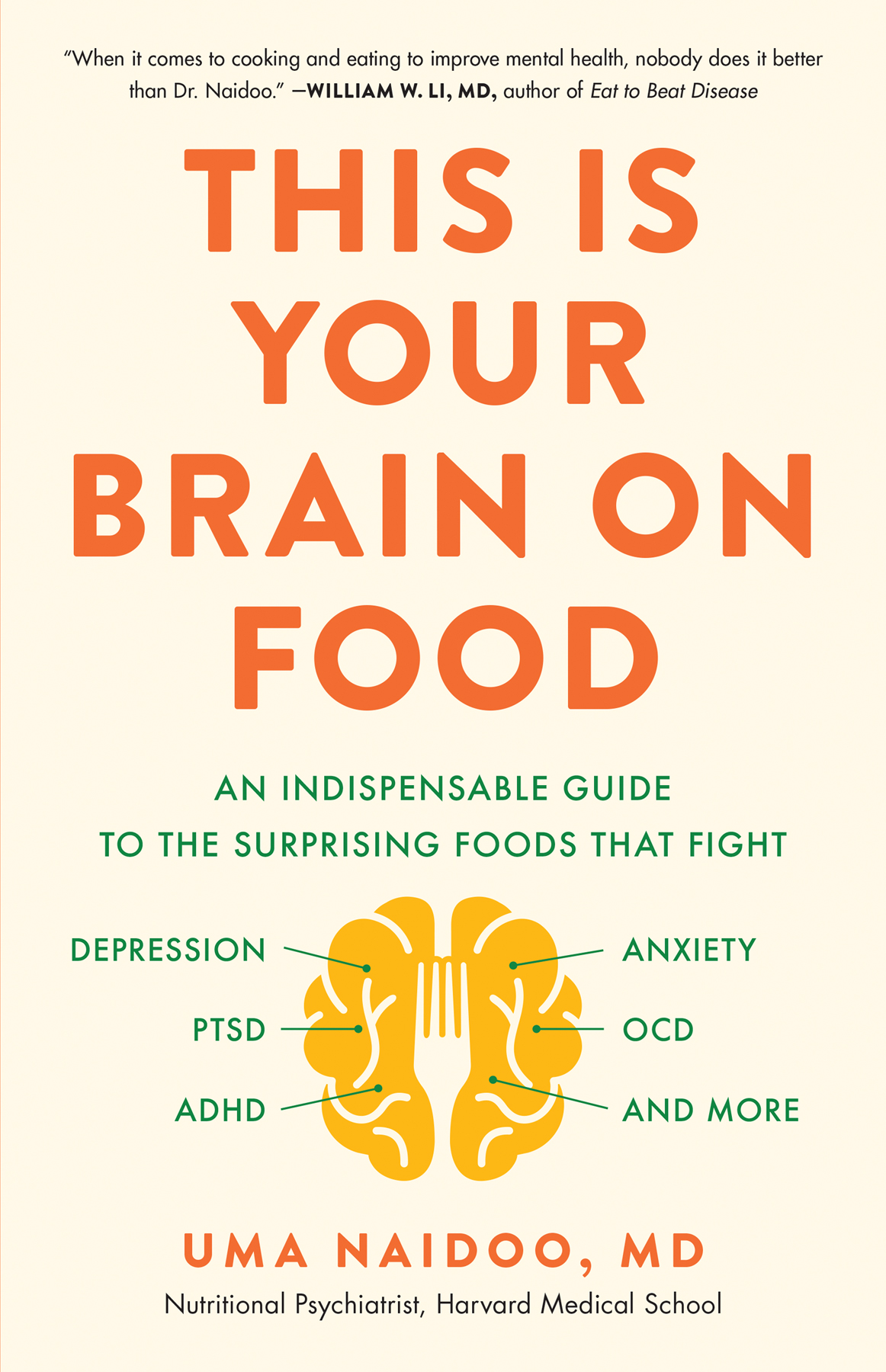
This book is intended to supplement, not replace, the advice of a trained health professional. If you know or suspect that you have a health problem, you should consult a health professional. The author and publisher specifically disclaim any liability, loss, or risk, personal or otherwise, that is incurred as a consequence, directly or indirectly, of the use and application of any of the contents of this book.
Copyright 2020 by Uma Naidoo
Cover design by Lucy Kim
Cover artwork Shutterstock
Author photograph courtesy of the author
Cover 2020 Hachette Book Group, Inc.
Hachette Book Group supports the right to free expression and the value of copyright. The purpose of copyright is to encourage writers and artists to produce the creative works that enrich our culture.
The scanning, uploading, and distribution of this book without permission is a theft of the authors intellectual property. If you would like permission to use material from the book (other than for review purposes), please contact permissions@hbgusa.com. Thank you for your support of the authors rights.
Little, Brown Spark
Hachette Book Group
1290 Avenue of the Americas, New York, NY 10104
littlebrownspark.com
twitter.com/lbsparkbooks
facebook.com/littlebrownspark
Instagram.com/littlebrownspark
First ebook edition: August 2020
Little, Brown Spark is an imprint of Little, Brown and Company, a division of Hachette Book Group, Inc. The Little, Brown Spark name and logo are trademarks of Hachette Book Group, Inc.
The publisher is not responsible for websites (or their content) that are not owned by the publisher.
The Hachette Speakers Bureau provides a wide range of authors for speaking events. To find out more, go to hachettespeakersbureau.com or call (866) 376-6591.
ISBN 978-0-316-53680-6
E3-20200611-JV-NF-ORI
This book is dedicated to my beloved late father and Pinetown Granny,
to my mom (who gave me the most important piece of advice in my life),
and to my husband, without whom this book would never have materialized.
N utrition and psychiatry may not seem like the most natural fit. When you picture Dr. Freud with his pipe and his leather couch, hes probably not scribbling a recipe for baked salmon on his prescription pad. Indeed, in my experience psychiatrists send their patients home with prescription drugs or referrals to other types of therapy, but no guidance on how food can help them with the challenges that brought them to the analysts couch. And though many conscientious modern eaters think constantly about the food were eatinghow it will affect our hearts, the environment, and most of all our waistlineswe dont think about its influence on our brains.
While this relationship between nutrition and mental health may not feel intuitive at first glance, its key to understanding twin epidemics in modern health care. Though medical knowledge and technology are better than they have ever been, both mental health disorders and bad health outcomes caused by poor dietary choices are disturbingly common. One in five American adults will have a diagnosable mental health condition in any given year, and 46 percent of Americans will meet the criteria for a diagnosable mental health condition sometime in their life. Thirty-seven percent of Americans are considered obese, with an additional 32.5 percent considered overweight, making a total of roughly 70 percent of the population above an optimal weight. An estimated 23.1 million Americans have a diabetes diagnosis, with another 7.2 million estimated to be undiagnosed. Thats a total of 30.3 million people, almost 10 percent of the population.
Much like the intricate relationship between the gut and brain that forms the basis of this book, diet and mental health are inextricably linked, and the connection between them goes both ways: a dearth of good dietary choices leads to an increase in mental health issues, and mental health issues in turn lead to poor eating habits. Until we solve nutritional problems, no amount of medication and psychotherapy is going to be able to stem the tide of mental issues in our society.
While fixing the broken relationship between diet and mental health is certainly important on a societal level, it can also make a crucial difference on an individual leveland not just for those who suffer from diagnosed mental conditions. Whether or not you have ever visited a mental health professional for depression or anxiety, every one of us has felt sad and nervous. We all have experienced obsession and trauma, large or small. We all want to keep our attention and memories sharp. We all need to sleep and have a satisfying sex life.
In this book, I want to show you ways in which you can use diet to achieve well-being in every aspect of your mental health.
When people learn that I am a psychiatrist, a nutritionist, and a trained chef, they often assume that I have been cooking since I was young and that my medical interests came later. But I actually learned to cook relatively late in life. I grew up in a large South Asian family surrounded by grandmothers, aunts, a mother, and a mother-in-law who were all exceptional cooks. I didnt need to cook! My mom, a double-boarded physician and excellent cook and baker, did get me interested in baking, and it was through the exact measuring of ingredients that the roots of my love for science took hold. Otherwise, I was happy to let others handle things in the kitchen.
When I moved to Boston to train in psychiatry at Harvard, I felt ripped from the love and warmth of my extended family and the delicious food that signified home. I knew I had to learn how to cook in order to carve out a home in this new place. My husband, being the brilliant person he is, already knew how to cook, but I banished him from the kitchen (at least so he likes to jokein reality he was an invaluable guide and brutally honest taste tester) and began to try out a few recipes that Id been taught.
For inspiration, I channeled memories of Pinetown Granny, as we called my maternal grandma. While my mom attended medical school during the day, I hung out with her and watched her cook. At three years old Id peer into the kitchen, not allowed to step anywhere near the hot stove and oven, and observe her closely. Wed start the day by picking fresh vegetables from the garden, then prepped fresh vegetables for lunch, set the table, told stories, and took an afternoon nap.
Since cable was an unaffordable luxury as we were getting on our feet in Boston, I also watched public television and met the magnificent Julia Child, dropping omelets and teaching me about French cuisine. She inspired great confidence in my cooking and kept me company during many lonely hours when my husband was completing his fellowship. Slowly and steadily, cooking became a part of me and a space in which I could decompress once I began residency.
Even after I began to work as a practicing psychiatrist, my passion for cooking stayed strong, and my husband suggested I spend some time at the Culinary Institute of America. I loved taking classes at the CIA but couldnt sustain the commute while actively working as a doctor in Boston. So I enrolled in an amazing local school, Cambridge School of Culinary Arts, and pledged to keep myself committed to both psychiatry and cooking.
I quickly learned that unlike the sexy medical dramas on TV, which are a far cry from the real-life medical world, professional-level cooking as it is depicted onscreen is really how it isa lot of screaming and yelling from the head chef, although theyre not usually as foul-mouthed as Gordon Ramsay. Though it is stressful, nothing beats the gratifying feeling when your meringue comes together perfectly, or when you appreciate the depth and flavor of a perfectly executed consomm, or when your pte is the texture of buttercream before it sets.
Font size:
Interval:
Bookmark:
Similar books «Your brain on food : an indispensable guide to the surprising foods that fight depression, anxiety, PTSD, OCD, ADHD, and more»
Look at similar books to Your brain on food : an indispensable guide to the surprising foods that fight depression, anxiety, PTSD, OCD, ADHD, and more. We have selected literature similar in name and meaning in the hope of providing readers with more options to find new, interesting, not yet read works.
Discussion, reviews of the book Your brain on food : an indispensable guide to the surprising foods that fight depression, anxiety, PTSD, OCD, ADHD, and more and just readers' own opinions. Leave your comments, write what you think about the work, its meaning or the main characters. Specify what exactly you liked and what you didn't like, and why you think so.

